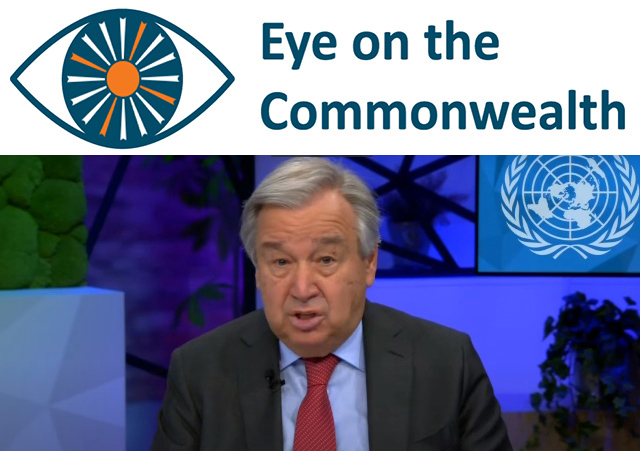 UN secretary-general, António Guterres, warned of the increasing threat from terrorists ‘exploiting power vacuums, longstanding inter-ethnic strife, internal weaknesses and state fragilities’.
UN secretary-general, António Guterres, warned of the increasing threat from terrorists ‘exploiting power vacuums, longstanding inter-ethnic strife, internal weaknesses and state fragilities’.
Two leading Commonwealth member states appeared to have been targeted by Islamist militants within days of each other as the United Nations’ secretary-general, António Guterres, warned of the increasing threat from terrorists who were ‘exploiting power vacuums, longstanding inter-ethnic strife, internal weaknesses and state fragilities’.
In Owo, south-west Nigeria, attackers burst into a Catholic church as worshippers celebrated Pentecost on 5 June and raked the congregation with gunfire, killing at least 40 people and wounding 87 more, many of them children. Some accounts later said more than 50 people were killed. ‘I heard a loud explosion and gunshots inside the church,’ a witness told the AFP news agency, adding that he saw at least five gunmen.
No group initially claimed responsibility for the attack, in Ondo state, some 250km from Lagos. However, Nigeria’s interior minister, Rauf Aregbesola, told journalists in Abuja a few days later that investigations were ‘zeroing in on the Islamic State of West African Province’ (ISWAP). Nigeria has been battling the Islamist insurgency of Boko Haram in the north-eastern states such as Borno for 13 years but the minister said it was the first time that the regional affiliate of Daesh, or Isis, had carried out an attack in the south-west. While Iswap has carried out several lethal attacks in the north-east, it has also expanded further south, claiming responsibility last month for killing at least two people in bombing a festival in Kogi state, which borders Ondo in Nigeria’s south-west.
A security analyst, Kabir Adamu, told Voice of America that there were several reasons why ISWAP might have carried out the attack. ‘Number one is terrorism, number two is political and then number three, it may be a message being sent to the governor,’ who Adamu said had tried to clamp down on marijuana producers in the state. ‘A neighbouring state, that is Kogi state, has witnessed such attacks, and it’s possible that those groups have crossed over into Ondo.’
Wole Soyinka, Nigeria’s Nobel laureate writer, also believed that the state governor, Rotimi Akeredolu, had been targeted but argued that it was a sign of ‘a nexus of operation between ISWAP, Boko Haram and Fulani herdsmen’. Another analyst also urged caution in attributing blame. ‘Iswap always claim big attacks, and always ones in the south,’ said Vincent Foucher, of the French National Centre for Scientific Research (CNRS). ‘They want to show they are strong and even expanding.’
Meanwhile, India’s security services were bracing for attacks from Al-Qaida in the Indian Subcontinent (AQIS) after the regional affiliate vowed to carry out suicide bombings in retaliation for comments by two spokespeople for the ruling Bharatiya Janata Party (BJP) about the Prophet Mohammad and his youngest wife Aisha that were considered insulting. The Indian news agency ANI reported that in a letter dated 6 June, AQIS warned that Hindu nationalist ‘terrorists should now await their end in Delhi and Bombay and in Uttar Pradesh and Gujarat … May our mothers be bereaved of us if we do not avenge our beloved prophet.’
A diplomatic row erupted after the two BJP officials made their comments, with 12 Muslim countries protesting at the remarks, including India’s fellow Commonwealth member, the Maldives. The BJP dismissed the two officials as ‘fringe elements’ whose views did not represent the government but this had limited success as Nupur Sharma was a high-profile national party spokeswoman and Naveen Kumar Jindal was its Delhi media head. It is the latest incident in a series of perceived attacks on Indian Muslims by BJP administrations, which included bans on female students wearing hijabs, as well as incidents such as the Delhi riots of 2020, in which dozens of Muslims were lynched by Hindu mobs, and other attacks on Muslims. In Uttar Pradesh, a BJP stronghold, the authorities ordered the demolition of the homes of Muslims protesting against the comments.
The threat from AQIS was dismissed by Ajay Sahni, a counter-terrorism expert at the Institute of Conflict Management, who said in reference to the Hindu nationalist agenda of the Modi government that: ‘AQIS has gained no traction here, nor has Islamic State. There has been no increase in recruits. The alienation of Muslims has not resulted in radicalisation.’ However, the arrest of five men belonging to another al-Qaida affiliate, Ansarullah Bangla Team, in Assam state in March suggested the existence of a network across the country, security officials believe.
Speaking at a meeting of the UN Global Counter-Terrorism Coordination Compact in New York last week, Guterres said that while the number of deaths from terrorism had declined, the threat was far from over, particularly in Africa. Sub-Saharan Africa accounted for 48% of terrorist deaths worldwide last year, he said, adding that terrorists were ‘now seeking to exploit and manipulate societal grievances and mistrust in governments in largely peaceful countries, such as Mozambique and Tanzania’.
While Guterres told his audience that ‘progress is possible’, pointing to positive steps he had seen on a visit to Nigeria’s Borno state, birthplace of Boko Haram, he added that terrorism could not be stemmed without tackling the conditions that allow it to spread. ‘Weak institutions, inequalities, poverty, hunger and injustice all provide fertile ground for terrorist recruitment and violent extremism,’ he said. Is it any coincidence that the threats from these powerful Islamist terrorist groups occur in two of the Commonwealth countries with the most citizens living in absolute poverty?
Oren Gruenbaum is a member of the Round Table Editorial Board



